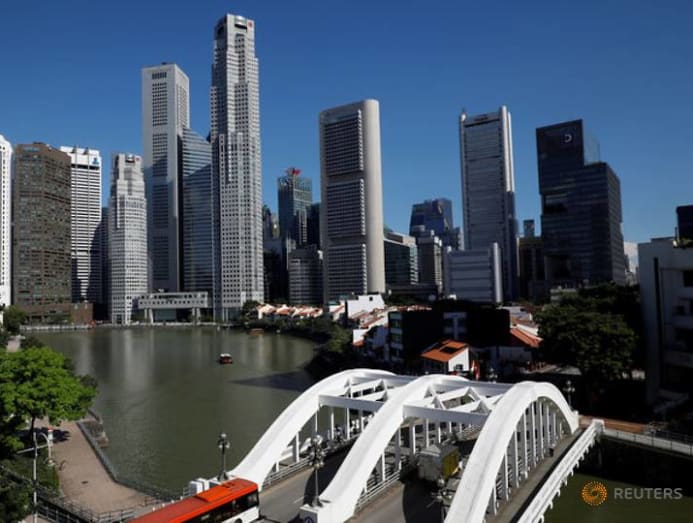Commentary: Confidence to ride out COVID-19 has diminished need for continued Jobs Support Scheme
Advertisement
Commentary
Commentary: Confidence to ride out COVID-19 has diminished need for continued Jobs Support Scheme
The winds of recovery are picking up and support for businesses should be focused on digitalisation, transformation and internationalisation, says SBF CEO Lam Yi Young.

(Photograph: iStock/joyt)
20 Oct 2022 06:03AM (Updated: 09 Nov 2022 03:00PM)
SINGAPORE: What is the toll of saving jobs amid the devastating affect of the COVID-19 pandemic?
Singapore has paid out over S$27.six billion through the Jobs Back up Scheme (JSS) as of September.
An estimated 77,500 jobs or around iii per cent of local employment was protected equally a upshot of the JSS, co-ordinate to Deputy Prime Government minister Heng Swee Keat, fifty-fifty while businesses struggled to cope with the pandemic-induced disruptions.
JSS A CRITICAL LIFELINE IN 2020
Indeed, the JSS has been an important lifeline, particularly concluding twelvemonth, when the business of many companies was survival.
The JSS helped companies deal with the initial daze, preserve capabilities, and retain employees.
At the tiptop of the pandemic, Singapore'south resident unemployment rate climbed to 4.8 per cent in September 2020, lower than Hong Kong's vi.three per cent and the United States' at 7.viii per cent.
By Dec 2020, Singapore'southward resident unemployment had fallen to 4.4 per cent and connected to taper off, nearing pre-pandemic levels by the second quarter of 2021.
In a survey by Singapore Business Federation (SBF) during last year's circuit billow, companies stated a preference for an increment in the elapsing and level of support of the JSS, over other back up measures like rental waivers, foreign worker levies and temporary bridging loans.

Afterward all, the JSS enabled dnata, a global airport services provider, to retain most of its local workers and invest in their reskilling.
These have put the visitor in proficient stead as demand for air travel picks up.
The JSS was as well critical for local enterprise Burnaby Solutions, which provides hotel accommodation and destination management services for local and international testify organisers, and enabled the company to pay staff on time.
Without needing to worry excessively nearly retaining employees, such firms could focus their efforts on other areas to meliorate recover from the pandemic.
This included pivoting to new areas of opportunities, business transformation and edifice new capabilities through digitalisation.
For instance, dnata rolled out "cool dolly" services at Changi Airport in October 2020, with high-tech containers transporting temperature-sensitive pharmaceutical goods like vaccines and providing an uninterrupted, ultra-cold chain between cargo warehouses and aircraft.
This kept dnata at the forefront of cargo treatment capabilities for COVID-19 vaccines.
More importantly, the JSS has held Singapore's aviation, hospitality and MICE (meetings, incentives, conferences and exhibitions) sectors together – preserving strategic capabilities that help ballast our position as a global node in Asia that is also the eye of a brimming business ecosystem in Singapore.
What is the all-time manner to let a worker go? And what should you look if asked to leave? HR experts give some advice on CNA's Heart of the Matter podcast:
FROM SURVIVAL TO RECOVERY IN 2021
In 2021, with the gradual, admitting uneven, pickup in global economic outlook, the centre of gravity of concern for companies has shifted from survival to recovery.
Green shoots of optimism can be seen in rising business sentiments. SBF's survey in June this year establish that 80 per cent of companies are confident of sustaining their business organisation over the next 12 months.
That brighter outlook may fuel employment, equally 43 per cent of businesses said they intend to increase headcount past up to 25 per cent, in roles such as business development, sales and marketing, besides equally Information technology and engineering science.
Companies well on their recovery journey have seen their needs shifting beyond the JSS to benefit from the Jobs Growth Incentive, which provides wage support for an increment in local headcount.
L ogistics start-upwards Ninja Van, for example, is looking to beef up its technology pb, with plans to hire about 200 engineers beyond Singapore, Vietnam and Indonesia, doubling its technology workforce to 400.
Leading solar free energy solutions provider Sunseap is riding the wave of opportunity in the growing light-green economy to expand its business organisation. To back up this growth, Sunseap is looking to recruit and train 300 locals as solar technologists.
Still, the recovery may be uneven. Tourism related sectors like air travel, hotels, attractions and MICE keep to face headwinds.
The recent expansion of Vaccinated Travel Lanes is a welcome boost, along with whatsoever continued reopening of borders. The extension of JSS for these sectors until Oct 24 has been key in sailing them through these additional months of hardships.
Targeted JSS payouts when tightened rules are imposed have helped when speed bumps in the form of the Heightened Alert periods or tightened prophylactic management measures, accept impacted sectors similar F&B, retail, gyms and fitness studios, performing arts and entertainment.
Such timely support has helped companies tide through periods where the brakes take to exist tapped to tiresome infection spread.
Dwelling house-grown coffee-and-toast chain Ya Kun experienced a noticeable drop in sales coinciding with the tightened safe management measures, on pinnacle of rising business costs with the increase in food prices and demand to acquire COVID-19 test kits and cleaning solutions over the past 20 months.
The JSS non only helped Ya Kun to pay staff in full and on time. Information technology also enabled the company to implement digital solutions to ameliorate its workflow and back up the work-from-home arrangements of employees.
How accept F&B veterans survived these start-stop restrictions? Ya Kun's Jesher Loi and Summer Loma'southward Anthony Yeoh tell us on CNA's Heart of the Matter podcast:
FROM RECOVERY TO GROWTH IN 2022
As we head into 2022, with higher vaccination rates giving countries the assurance economies tin stay open, the eye of gravity for companies is expected to shift from recovery to growth.
Even the more impacted air travel and tourism sectors are expected to come across greater recovery as borders go on to open up and travel resumes.
The Singapore economy grew by vi.5 per cent in the third quarter, a sign the economy may exist on rail for above-tendency growth, according to analysts.
Us, Thailand and many other countries accept announced quarantine-free arrivals for vaccinated travellers over the by week.
As the winds of recovery pick upwards, and more companies progress on their growth journey, the need for continued JSS has diminished, salve for periods of shocks or speed bumps like tightened safety management measures.
Companies mostly recognise that continued broad-based JSS is non sustainable and that they cannot rely solely on the JSS to sustain their business.
The route ahead may therefore require a switch in support towards capability building, digitalisation, transformation and market place expansion through internationalisation.
Wah & Hua, a waste management company, has been tapping on automation and bogus intelligence to reduce its reliance on foreign workers. It is also building an integrated incinerator found - the starting time in Singapore to sort recyclables from waste in a single facility using robots.
To help more companies accomplish their best, SBF has diverse initiatives we promise firms will take advantage of. The Manufacture iv.0 Human Majuscule Initiative, launched in March 2020, helped 106 businesses undertake successful transformation and job redesign.
The pilot run of SBF's MAP initiative to meliorate position businesses for the post-pandemic uplift supported 300 companies, with the 2nd run launched on Monday (October 18).
The GlobalConnect@SBF programme has helped businesses seize new opportunities overseas to grow their business, while the Professional person Conversion Program for Internationalisation Professionals will further support companies in building capabilities in support of market expansion.
The JSS has played a critical and crucial role in helping companies to survive the shocks and disruptions brought about past COVID-19.
It allowed companies to stay adrift, preserve capabilities and helped them position for this coming recovery.
The side by side phase of Singapore's reopening volition run into their needs pin towards business expansion and growth, and support for firms should likewise pin.
Lam Yi Immature is CEO of the Singapore Business Federation.
Contempo Searches
Trending Topics
Source: https://cnalifestyle.channelnewsasia.com/commentary/jobs-support-scheme-businesses-workers-salary-pay-offset-government-297996

0 Response to "Commentary: Confidence to ride out COVID-19 has diminished need for continued Jobs Support Scheme"
Post a Comment